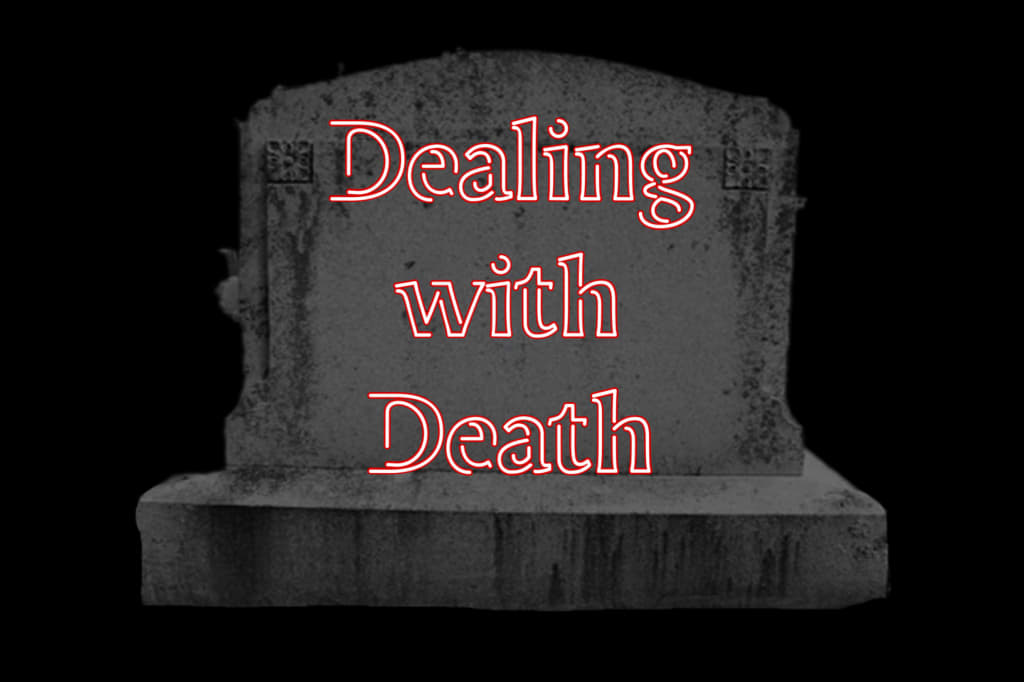5 Things to Remember
Coping with Loss

The Rollercoaster of Emotions
Coping with loss and grief can be quite the emotional rollercoaster. Navigating that journey properly is confusing to say the least.
After losing my dad to a long and grueling battle with cancer, I struggled for years with how to deal with it healthily.
Every person is different, but I thoroughly believe that some truths are universal, and can be applied to coping situations across the board. Obviously, these points are interpreted and executed differently for different people, but the overall point remains the same.
In an effort to use my personal experiences as a way to potentially help someone going through grief/coping with the loss of a loved one, I thought about the universal truths I felt could apply here, as well.
My coping journey has and continues to be one that I must constantly prioritize. However, when I find myself slipping into a darker place, I reflect back on what I have learned to get myself back on a more healthy track.
Experiencing Versus Living Your Emotions
Grief isn’t meant to rule your life. In fact, healthily learning to cope with it, including learning to thoroughly embrace the various stages of it, allows you to discover your inner resources and learn how to better rule your life, versus being ruled by its circumstances.
Taking your power back, instead of allowing yourself to be overpowered by your grief, is much easier said than done. Again, it is something I must continue to prioritize in an attempt to live my best life. Even then, I still have my moments where my emotions overtake my mind, and I have to carefully attempt to guide myself back.
That being said, here are five truths I’ve had to learn to embrace in relation to my coping and grieving process. It took a lot of trial and error, as well as tremendously negative emotional anguish to reach this place. Most importantly, it took TIME, PATIENCE, and UNDERSTANDING/SELF COMPASSION to uncover these truths I have used in my current journey.
Five Things to Remind Yourself as you Cope with the Loss of a Loved One.
1. It is okay to feel sad.
It is actually an extremely healthy approach to allow yourself to experience these emotions. As hard as we may try, we can never FULLY suppress our feelings. They will eventually push through in some fashion, at some point in time. Negative emotions are oftentimes associated with toxicity , but it is actually our approach with dealing with these negative emotions that determine how beneficial versus toxic they will be.
One of those approaches, as I just stated, is attempting to suppress the feelings. Trust me when I say that I have tried this for years, with various tragedies and bad moments in my life. I am currently building myself back up, and becoming stronger by the day, but I never wish to revisit the dark place that hiding from my emotions caused me to go.
Another approach I have personally found very useful is thoroughly understanding the difference between FEELING SAD, and BEING SAD. Once we let the sadness overpower our BEING, it can easily overpower our LIFE. That is when the vicious bouts of depression, especially if you are predisposed to such states, can quickly sneak up.
2. There is growth in pain.
It is safe to say that almost everyone would agree that experiencing an extreme state of grief or pain is not pleasurable. Yet, we oftentimes forget to see the good that can come from some of the worst circumstances. With every situation we face, there are lessons and wisdom that can be found. This is why it is so important to healthily explore those feelings, although it is oftentimes one of the toughest things to do.
Don’t merely question the negative aspects...for example,
“How could something so terrible happen to such a good person?”
“How can I ever go on? Life will never br the same.”
The truth is, these are answers we will likely never fully understand. Perhaps they aren’t meant to be.
You must look at the situation from multiple viewpoints/perspectives.
If you have to address the negative outlooks (and let’s be honest; we are grieving, so that is understandable), you must also allow for any positive outlooks, as well.
Ask yourself questions like,
“How fortunate am I that I was able to know such a beautiful soul?”
“What impact did they leave on my life? That is something that will never go away.
“How can I use what I have learned from this person and this loss to become a better, stronger version of myself?”
If we are able to balance our pain with the wisdom we can draw from it, we are given the opportunity to grow. Growth is one of the most beautiful aspects of life, and should not be an opportunity that we deprive ourselves of having.
3. It is also okay to be happy, and to celebrate their life. In fact, it is necessary.
For life to not be unbearably chaotic, we must seek balance in the aspects of it that we can control.
We should not limit ourselves to now only acknowledging the feelings grief that is experienced after their loss.
What purpose do the good memories serve if we instantly discard them as soon as we lose someone?
Yes, we may always be plagued by bad memories. Letting them cover our fond ones leaves us in a position where a healthy response to the loss is impossible. We simply cannot feel balanced this way. We can’t feel any happiness if we fail to remember what made us happy.
We may want to mourn every holiday and every situation that reminds us of our loss, and we have the right to do so. However, in their memory, it is only fair that we also surround ourselves with positive reminders of them.
Celebrate their birthday/other days that you associate with them. Relish in a fond memory upon seeing something that sparks it.
Everyone has a unique approach as to how to properly do this, but being able to find the one that works for you will do wonders for your soul. You can choose the amount of social interaction you are comfortable with. You can choose to go all out in your celebration, or merely do something small that reminds you of that person. Even the smallest acts are significant, and are yours to decide.
However, from personal experience, I will say this: Until I learned to do this, I made myself much more miserable than I needed to be.
The grief will continue; that is a seemingly unfortunate effect that you oftentimes will never rid yourself of. Why attempt to make it even worse by only allowing yourself to fester in misery?
4. They are only PHYSICALLY gone.
Yes, the fact that the physical life has been taken from someone is a very hard concept to fathom. However, this does not determine the end of THEM, and of the impact they left.
Do you find that you do particular things, or respond in certain ways, that remind you of them? They aren’t physically there to encourage those habits, but a part of them still resides in you.
Regardless of your religious beliefs, there is no denying that once someone is physically gone, there is still evidence that they were here, and they still live on in our memories.
Taking it one step further, what I have found to be a more soothing approach for my grieving stages is to really break down the impact that they left on both me and the world.
If I had to sum up the legacy they wished to leave behind, what would I say?
Instead of merely saying those things, I try to act on them. Since they are no longer physically there to continue spreading their contribution, I attempt to put my own little spin on how they impacted me. It may not bring them back physically, but it makes me feel as if they ARE still there, in a certain capacity. It reminds me of the impact they left on me, and makes my heart smile.
Losing someone dear to you, by deduction, means that that person left a lasting impact on you, and probably multiple others.
We may not be able to fully control how long our body is alive, but we can control how we utilize the time we have to make an impact.
Likewise, our loved ones will physically expire. That is out of our control. However, we can honor their legacy carry on their impact.
**EXTREMELY IMPORTANT**
5. DO NOT REGRET WHAT DID OR DID NOT HAPPEN!
Yes, perhaps you think that you “should have done this,” or that “if you had said that, it may have helped.”
Ok. There is no denying that consequences change as responses to situations do.
There is also no denying that we can all likely think of times, looking back, that we wish we would have responded differently.
However, what we fail to acknowledge is that, for better OR worse, ALL actions change the course of events, even if slightly.
We are not able to predict our futures. If we could, we wouldn’t likely find very many, if any, things we would go back and change. By consequence, we definitely are not able to predict our futures based on multiple, various scenarios. That logic holds no validity.
Therefore we simply cannot, with full confidence, say that we should have done things differently.
We may think it would give us somewhat more of a peace of mind, but how can we REALLY be sure? Just as we cannot predict our futures, we also cannot predict them under different circumstances.
If the mindset isn’t in a good place, happiness and acceptance literally aren’t possible. It is easy to forget that, and instead place part of the hurt on our own conscious. However, this leads to nothing but more heartache.
Instead of focusing on “what could have been,” or “what should have been,” we should instead focus on “what can now be.”
How can this situation make us more wise, more mentally strong, and more in tune with our FUTURE selves?
How can the one or ones we lost help shape our future selves?
We cannot change the past, but we CAN influence the future.
Healthy Grief is Just That…Healthy.
Take the same advice you would give a good friend in your situation, and use it on yourself. From personal experience, I have found that there seemed to be no chance of ANY recovery or acceptance from the tragedy until I fully embraced and understood this point.
“If we cannot go back in time physically, why are so many of us obsessed with doing so mentally?” -Annie Mae Edwards

***I thoroughly hope that someone can find some sense of solace in this, as well.
To anyone who is currently experiencing grief,
Please allow each of each of these points to sink in. Go into each day with the knowledge that even though you WILL experience grief, you WILL be okay. Just because you can’t currently see any light at the end of the tunnel doesn’t mean that it doesn’t exist.
Keep going. Trust me (even if you can’t ‘trust the process’ just yet).
Embrace this process, without rushing it. Life may never be the same, but it isn’t meant to be.
Once we begin to accept that all circumstances, negative and positive, allow room for personal growth, we can begin to experience that personal growth.






Comments (2)
I wish I had gotten to meet your dad, reading this I feel how much you love him. I love hearing about him and learning about how he’s still in your life in special ways. Thinking about you.
Such beautiful writing Annie ❤️